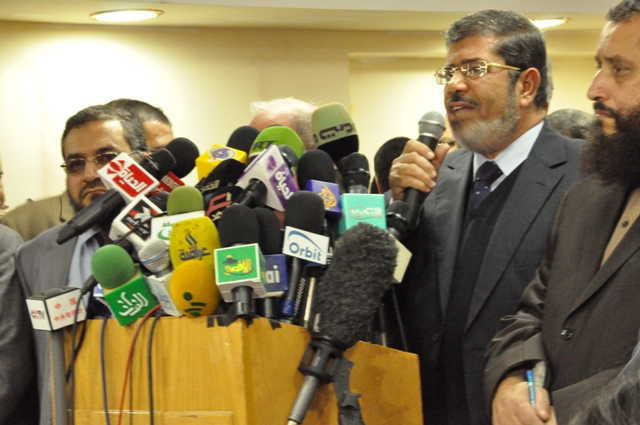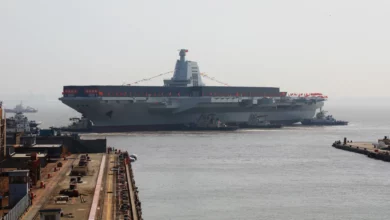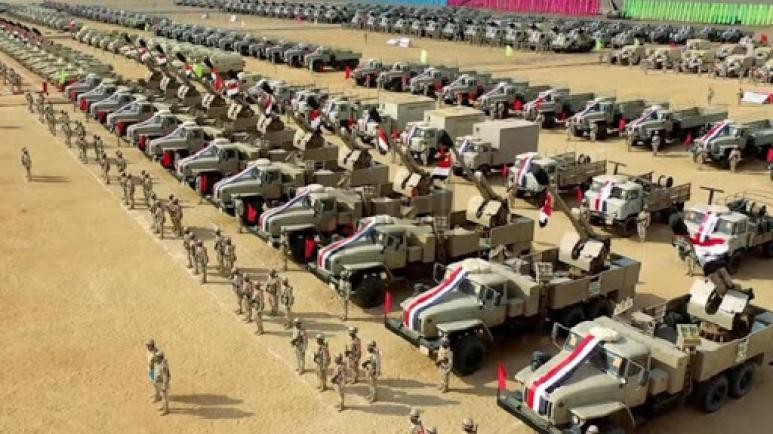
Amid the ongoing political turmoil, the Muslim Brotherhood seeks to walk a fine line between proving its commitment to the revolution’s pro-democratic demands and not antagonizing Egypt’s de facto military rulers.
Since last week, the Brotherhood’s Freedom and Justice Party, which stands as the largest bloc in the newly elected People’s Assembly, has found itself obliged to deal with the public uproar that followed the killing of at least 74 people in last week’s football violence in Port Said.
While thousands took to the street putting the blame on the Supreme Council of the Armed Forces and shouting “down with military rule,” the FJP-led Parliament was content to put the blame on the interior minister and form a fact-finding commission to investigate the matter, ignoring radical demands to rebel against the military-set transitional road map, expedite the handover of power to civilians and withdraw confidence from the SCAF-appointed cabinet.
“[The Brothers] think this is the optimal solution that can give something to the street and in the meantime does not upset [SCAF],” said Ashraf al-Sherif, a political scientist with the American University in Cairo, arguing that such a tactic might back fire.
“You cannot please both camps simultaneously. At certain points, you should take clear and firm stances,” said Sherif, an expert on political Islam.
Parliament’s decision last week fell short of containing protesters’ outrage. For almost five consecutive days, clashes raged between demonstrators and police around Interior Ministry’s headquarters in Downtown Cairo. While protesters threw stones, police responded with tear gas and birdshot. Similar clashes have erupted in Suez. So far, at least 15 people have been killed and hundreds injured.
“[The Brothers] are proving to the people that Parliament is useless and idiotic,” contended Sherif. “They will be putting themselves on the track of committing quick political suicide, especially if the crisis continues to flare up and people remain in the street attacking the police.”
The violence has waned since Tuesday but resentment toward the police continues.
The chasm between the angry demonstrators in the street and lawmakers seemed quite wide on Monday. During the parliamentary session, most speakers dismissed protesters rallying near the Interior Ministry as thugs, an attitude that provoked liberal and leftist parliamentarians.
But FJP lawmaker Azab Mostafa sees no chasm, insisting that those on the street are not true revolutionaries.
“What revolutionary forces are you talking about?” wondered Mostafa. “We should know that those who are throwing stones outside the Interior Ministry are not revolutionaries. But they are backed by other forces to carry out a particular plan.”
The Brotherhood’s official discourse maintains that the remnants of Hosni Mubarak’s regime as well as “anarchical” and “socialist” groups are seeking to instill chaos and thwart Egypt’s transition to democracy. Such a discourse, coupled later with its “lenient” reaction to the football violence, had earned the Brotherhood vehement criticism from revolutionary groups and fed into allegations that the Brothers had already struck a power-sharing agreement with the generals and abandoned the revolution’s goals.
Pakinam al-Sharqawy, a political science professor at Cairo University, dismissed such criticism as “exaggerated,” arguing that the FJP’s reaction to recent incidents is quite “balanced.”
“[FJP lawmakers] are not being lenient to the extent of not acknowledging SCAF mistakes or not reacting,” said Sharqawy, who occasionally writes for FJP’s official newspaper. “They believe that their reaction should be well calculated so that the situation will not reach an open clash with SCAF and hence give the latter the pretext to thwart the handover of power altogether.”
A head-on confrontation can lead to a political stalemate. Hence, the generals can seize the opportunity and enact martial law and thwart prospects for democracy, argued Sharqawy.
Like revolutionary forces, the FJP believes that the generals should return to the barracks as soon as possible. Yet it adopts a more gradual approach to attain this objective, Sharqawy said.
“They believe in gradualism to bring about change,” Sharqawy argued.
Overhauling the police: A tough endeavor
Restructuring the security apparatus seems the main point of contention between revolutionaries on one hand and the generals on the other. The Brotherhood has talked extensively about the need to proceed with such a move in order to overhaul one of the main pillars of Mubarak’s authoritarian regime.
“Even before we became a relative majority, we had an idea on how to restructure the police because what happened over the last 30 years made this ministry err from its raison d’être,” Mostafa told Egypt Independent, adding that his party is already working on a bill to achieve this goal.
Although there seems to be an urgent need to put this legislation on the table immediately to contain the unrest, Mostafa said he still does not know when the bill can be ready.
Sherif questioned the seriousness of the Brotherhood to proceed with the restructuring of the police apparatus.
“This is just rhetoric, because the matter is not really in [the Brotherhood’s] hands. The purging of the Interior Ministry is in the hands of the security institutions, such as the military and the intelligence,” said Sherif.
“You need the will and force to purge the Interior Ministry. You also need information,” he said.
The intelligence is held as the only agency that can provide information on the ins and outs of Mubarak’s police, and the military is the sole institution that can contain the repercussions of a genuine purge, including a potential security vacuum.
Rebelling against a military-set path
The Muslim Brotherhood proved quite resistant to proposals put forward by some secular parliamentarians to withdraw confidence from the incumbent cabinet after its failure to prevent the occurrence of Port Said’s killings and have the FJP, which holds more than 40 percent of the seats, lead a government of national salvation.
“What is the problem with having the [incumbent] government stay for the remaining few months?” asked Mostafa, arguing that a new government will be formed anyway after the transitional period is concluded by 30 June.
According to Sameh al-Barqy, a former Brotherhood member and one of the young revolutionaries, the organization believes it could incur political losses if it leads a government while the military is still in charge.
“The people would expect firm stances from a national salvation government vis-a-vis the military,” said Barqy, arguing that the Brothers cannot afford such a position because this might jeopardize their interests. In the meantime, heading a cabinet that takes soft stances would undermine their popularity, he added.
For many pundits, the Muslim Brotherhood fears that a confrontation with the generals would result in a bone-breaking crackdown on their organization and eventually the loss of all the benefits they have reaped since Mubarak’s ouster. The group, which struggled with an official ban and resilient media smear campaigns for decades, now has a political party that holds the relative majority in Parliament and stands as Egypt’s prime civilian political player.
The recent killings have also given momentum to liberal and leftist calls to tweak the military-set transitional road map, which stipulates that the constitution shall be drafted, then a president shall be elected and finally the generals shall withdraw. Some parliamentarians proposed that the presidential elections be held first to send the military back to the barracks before their due time and put an end to their mismanagement. Later, civilians can draft a constitution away from the generals’ guardianship, according to that proposed blueprint.
Yet the FJP remains against such a suggestion.
“We are with handing power over earlier than scheduled but according to the preset plan,” said Mostafa, insisting that the no president should be elected before the constitution is drafted.
The president should take office knowing his exact authorities — something that the constitution will have to lay out first, he added.
Mostafa went on to argue that the drafting of the new constitution will not require too much time. He said there is a consensus among political forces over incorporating the first four chapters of the old constitution into the new one. Only the fifth chapter, which defines the nature of the political system and the distribution of power among the government’s three branches, will require amendments, he added.
By holding onto the original road map, the Brothers are believed to be appeasing to the generals, who insist on being involved in the writing of the constitution to secure their privileged status in the new order.
In a desperate measure to contain public outrage, the generals decided earlier this week to set an earlier date for presidential hopefuls to field their candidacies. Potential candidates are now set to apply starting 10 March instead of mid-April. It remains unclear whether the military can succumb to street pressures and hold presidential elections before the new constitution is written.




